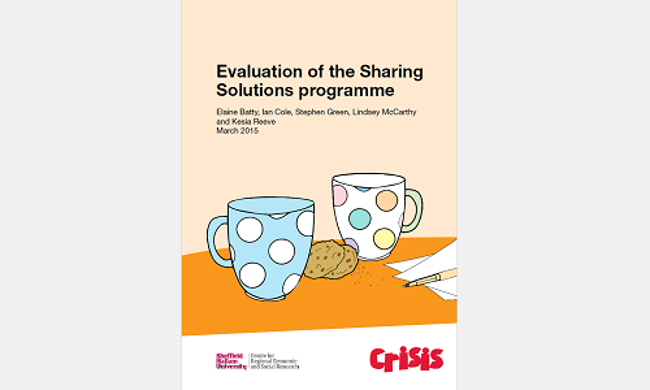Evaluation of the Sharing Solutions programme (2015)
21.03.2015
The report evaluates the Sharing Solutions programme which was funded by the Department for Communities and Local Government (DCLG) and ran for 18 months from 2013 until 2015.
The programme aimed to increase the amount of shared accommodation for those subject to the Shared Accommodation Rate (SAR) of the Local Housing Allowance (LHA) as well as improve the way in which schemes supported both tenants in shared accommodation and landlords letting their properties out to sharers.
Conclusions
The increased pressure on housing markets across the country, as the result of lack of supply, patterns of new household formation, persistent affordability pressures, and reductions in housing and other welfare benefits make it inevitable that more people will move into shared accommodation as the most financially viable solution to their housing needs. However, there is also a reluctance to enter into sharing with ‘strangers’ rather than family members or friends, and these concerns are highlighted for many members of vulnerable groups facing challenges such as living with others, gaining access to the PRS, and then sustaining a tenancy. In terms of supply, landlords are also often reluctant to take on shared accommodation due to the management complexities (and costs) that can arise (for example on termination of tenancy) and because they fear returns may be lower than in self-contained accommodation. In this context, Sharing Solutions is an opportune programme which has been able to test out various ideas for making shared accommodation a more attractive option for tenants and landlords alike. The evidence in this report suggests that a number of the potential barriers to developing more, and better, shared accommodation can be overcome, if additional support, effective partnership working and the dissemination of good practice are to the fore.
The Sharing Solutions programme has demonstrated that shared accommodation can be made to work effectively for low income tenants who are in receipt of welfare benefits, given intensive support and training. This in turn requires both additional funding and expertise of working in the sector, which is at a premium in many local areas. This review of the eight pilot schemes indicated that staff, volunteers and stakeholders all understood the needs of the client groups involved and had experience of engaging with, and intervening in, the private rented sector. However, their capacity to develop sustainable networks and ways of working is inevitably hampered by their reliance on grant funding. The specific funds for the programme made available by DCLG had a very positive impact. The programme provided assistance for around 200 clients over a 15 month period. By January 2015 it had provided accommodation to 172 clients and at the time of writing only 19 of these tenancies had ended for negative reasons.
But in the current (and future) spending climate, it is essential that any new scheme can produce savings as well as meet housing needs. The use of the Crisis’ Making it Count tool showed that there was a total gross saving (through reducing homelessness) of £625,000 per quarter, against a cost of £120,000. For every £1 of grant funding, £5.21 of savings was generated. The positive outcomes for tenants and landlords discussed in this report indicate that investment in PRS access projects to promote sharing solutions is a worthwhile and cost effective policy. But it requires the funds, and the political will, to kick-start schemes, and intensive support is required to sustain tenancies in the long-run - both to assist the tenant, and to incentivise landlords to rent their properties to vulnerable people. This comes at a price; but this report shows that the eventual benefits of programmes like Sharing Solutions will soon outweigh these costs, if they can thereby prevent an increase in homelessness among this ‘at risk’ group on the margins of the housing market.
Reference
Batty, E., Cole, I., Green, S., McCarthy, L. & Reeve, K. (2015) Evaluation of the Sharing Solutions programme. Sheffield: Sheffield Hallam University.
Downloads

Evaluation of the Sharing Solutions programme (PDF)
Evaluation of the Sharing Solutions programme which was funded by the Department for Communities and Local Government (DCLG). It ran for 18 months from 2013 until 2015.
